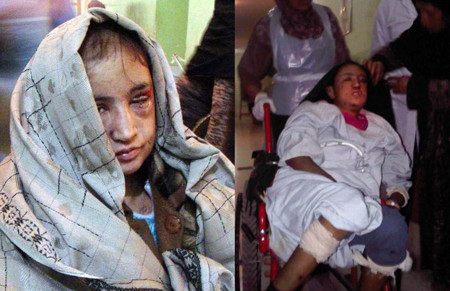A court in Kabul ordered the early release of three people convicted over the torture of a child bride, an official confirmed Saturday, in a move denounced by activists as a blow for women’s rights.
Sahar Gul, who was 15 at the time her ordeal, was burned, beaten and had her fingernails pulled out by her husband and in-laws after she refused to become a prostitute in a case that shocked the world.
She was found in the basement of her husband’s house in northeastern Baghlan province in late 2011, having been locked in a toilet for six months prior to her rescue by police.

Sahar Gul, a 15-year old girl brutally tortured by her in-laws for refusing prostitution. (Photo: RFE/RL)
Her father-in-law, mother-in-law and sister-in-law were sentenced to prison for 10 years each for torture and attempted murder, though her husband remains at large.
“But after the court reviewed their case, it found out that they were only involved in family violence,” Supreme Court spokesman Abdullah Attaee told AFP.
The court did not have enough evidence against them, he said, adding a fresh prosecution would be launched .
“For now, the court has ruled that the time they have spent in jail is enough for them,” he said, though he could not say when the ruling was made or whether the trio had yet been freed.
Afghan rights groups expressed indignation over the early releases, calling it a step back in time for Afghanistan’s women.
“This case, once heralded as a legal triumph underscoring the advances for women’s rights in the past decade in Afghanistan is now a harbinger of a grim future,” Women for Afghan Women, a Kabul and New York based women’s rights organisation who helped Gul during the trial wrote on their website.
Violence and abuse against women continues to be a major problem in Afghanistan a decade after US-led troops brought down the notorious Taliban regime.
In May the Afghan parliament cut short a debate on a bill to protect women from violence after complaints from some traditionalist MPs that it was against Islamic teaching.
The Elimination of Violence against Women (EVAW) law, which was passed by a presidential decree in 2009, is seen as a benchmark piece of legislation marking progress since the fall of the Taliban regime nearly 12 years ago.



